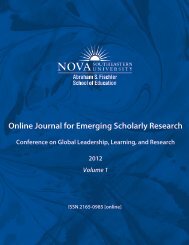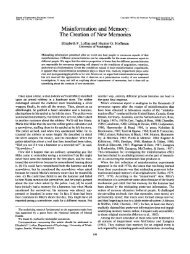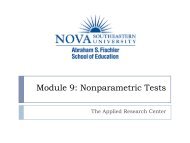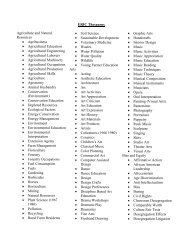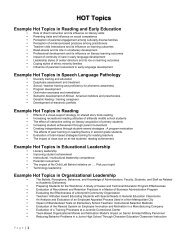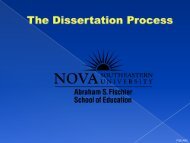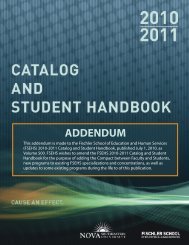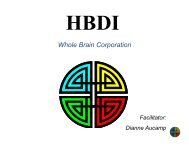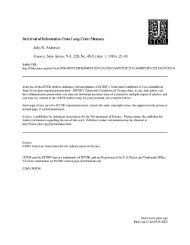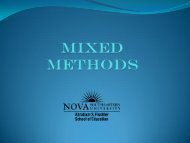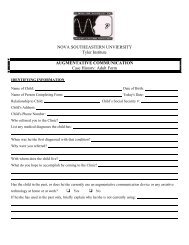The Concept Paper Chapter 1 - Fischler School
The Concept Paper Chapter 1 - Fischler School
The Concept Paper Chapter 1 - Fischler School
- No tags were found...
You also want an ePaper? Increase the reach of your titles
YUMPU automatically turns print PDFs into web optimized ePapers that Google loves.
<strong>The</strong> <strong>Concept</strong> <strong>Paper</strong><strong>Chapter</strong> 1
Objectives• Overview of dissertation• Review of chapter 1 sections• Particular focus on topic selection• At the end of this presentation studentsshould be able to write their <strong>Concept</strong><strong>Paper</strong>’s <strong>Chapter</strong> 1
What is an Applied Dissertation?According to theApplied Dissertation Procedures Manual….– “…should follow the scientific method and shouldcontribute to the literature in your concentrationarea”.– “…entails a series of independent writing andresearch activities …”
Remember …• Mullins & Kiley (2002, p. 386)“…All you need to do is todemonstrate your capacity forindependent, critical thinking.That’s all you need to do. A PhD isthree years of solid work, not aNobel Prize.”
Topic Selection Considerations• Personal interest• Organizational support• Ethical issues• Relevance of the study• Contribution to the field• Time constraints• Breath/scope• Economic Factors
Sources of Topic Selection• ERIC, PsycINFO, Medline• Journals, books and dissertations in your field• Conferences, workshops, presentations• Recommendations about future research• Courses• Workplace• Expert consultations• Online library services
<strong>Concept</strong> <strong>Paper</strong>• First of three dissertation benchmarks• Is worth 2 credits• Typically 10-12 pages (excluding title page andreferences)• Presents student’s proposed research agenda• Represents the first 3 chapters of thedissertation
MOI Capstone Assignment<strong>Chapter</strong> 1<strong>The</strong> Topic: This is a brief description of the proposed area of study. Include atleast two sentences.<strong>The</strong> Research ProblemThis is an area of conflict, concern, or controversy (a gap between what iswanted and what is observed). Include the most relevant reference thatsupports the claim.Background and Justification<strong>The</strong> evidence and relevance from the literature and published or archival datashowing the problem exists. Include at least two references. You should alsohave a theoretical basis for the study.Deficiencies in the EvidenceInclude a brief discussion that details the area of need (in relation to theproblem) and the deficiency or lack of evidence in the literature.AudienceDiscuss who is affected and who benefits.
What Is a Research Problem?A research problem is an educational issue orconcern that an investigator presents andjustifies in a research study.John W. CreswellEducational Research:Planning, Conducting, andEvaluating Quantitative andQualitative Research, thirdedition3.9
Differences between the Topic,Problem, Purpose, and QuestionsGeneralTopicDistance learningSpecificResearchProblemPurposeStatementResearchQuestionLack of students in distanceclassesTo study why students do notattend distance education classes ata community collegeDoes the use of Website technologyin the classroom deter studentsfrom enrolling in a distanceeducation class?John W. CreswellEducational Research: Planning,Conducting, and Evaluating Quantitative3.10
Determining Whether a Problem ShouldBe Researched• Do you have the authority to study theproblem?– Do you have access to the research site?– Do you have the time, resources, and skills tocarry out the research?• Should you study the problem?– Does it advance knowledge?– Does it contribute to practice?John W. CreswellEducational Research: Planning,Conducting, and Evaluating Quantitative3.11
Determining Whether a Problem ShouldBe Researched (cont’d)• Will your study fill a gap or void in the existingliterature?• Will your study replicate a past study, yetexamine different participants and differentresearch sites?• Will your study extend past research orexamine the topic more thoroughly?• Will your study give voice to people notheard, silenced, or rejected in society?• Will your study inform practice?John W. CreswellEducational Research: Planning,Conducting, and Evaluating Quantitative3.12
Five Elements of a “ProblemStatement”FLOW OF IDEASTopicSubjectareaEducationalIssue•A concern•A problem•Somethingthat needsa solution,improvement,or remediationEvidencefor theIssue•Evidence fromthe literature•Evidence frompublic orarchival dataDeficienciesin theEvidence•In this body ofevidence, whatis missing?•What do weneed to knowmore about?WhatRemedyingthe DeficienciesWill Do forSelectAudiencesHow will addressingwhat we need toknow help:– researchers?– educators?– policy makers?– individuals such asthose in the study?John W. CreswellEducational Research: Planning,Conducting, and Evaluating Quantitative3.13
Example of the Flow of Ideas in theProblem StatementFlow of IdeasTopicResearchProblemJustificationfor ResearchProblemDeficiencies inthe EvidenceRelating theDiscussionto AudiencesSubjectarea•Concern or issue•A problem•Something thatneeds a solutionimprovement,or remediation•Evidence from theliteratureEvidence frompublic orarchival data•In this body ofevidence what ismissing or whatdo we need toknow more about?•How will addressingwhat we need to knowhelp researchers,educators, policymakers, and otherindividuals?John W. CreswellEducational Research: Planning,Conducting, and Evaluating Quantitative3.14
Example of the Flow of Ideasin the Problem StatementFlow of IdeasAn Example:TopicResearchProblemJustificationfor ResearchProblemDeficiencies inthe EvidenceRelating theDiscussionto AudiencesEthicalissuesincollegesEthicalviolationsamongfootballrecruiters•Gap in theliterature•Reports ofviolationsDescriptionidentifyingandcharacterizingviolations•Assessing violations•Helps recruitersdevelopbetter ethical standards•Helps athletesunderstand ethicalissues



